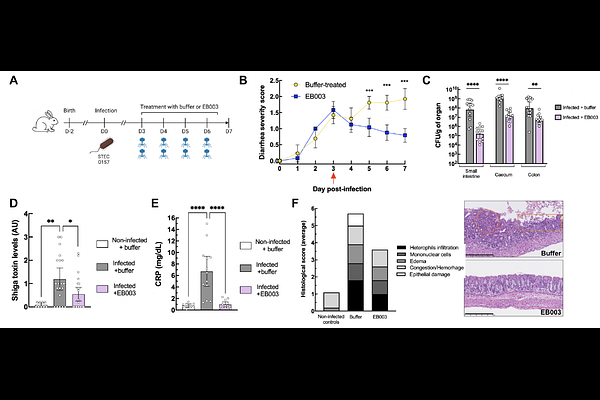Treatment of STEC infection via CRISPR-Cas targeted cleavage of the Shiga toxin gene in animal models

Treatment of STEC infection via CRISPR-Cas targeted cleavage of the Shiga toxin gene in animal models
Galtier, M.; Krawczyk, A.; Fuche, F. J.; Charpenay, L. H.; Stzepourginski, I.; Pignotti, S.; Arraou, M.; Terrasse, R.; Brödel, A. K.; Poquet, C.; Prevot, G.; Spadoni, D.; Buhot, B.; Munch, K.; Havranek, J.; Cardenas Ramirez, P.; Rouquette, M.; Decrulle, A.; Kerbarh, O.; Lieberman, E.; Bramorski, C.; Grienenberger, A.; Hessel, E. M.; Salzano, G.; Garry, D. J.; Leveau, A.; Duportet, X.; Bikard, D.; Fernandez-Rodriguez, J.
AbstractEscherichia coli is a ubiquitous gut commensal but also an opportunistic pathogen responsible for severe intestinal and extra-intestinal infections. Shiga toxin-producing E. coli (STEC) pose a significant public health threat, particularly in children, where infections can lead to bloody diarrhea and progress to hemolytic uremic syndrome (HUS), a life-threatening condition with long-term complications. Antibiotics are contraindicated in STEC infections due to their potential to induce prophages carrying Shiga toxin (stx) genes, triggering toxin production. Here, we present a CRISPR-based antimicrobial strategy that selectively targets and eliminates O157 STEC clinical isolates while preventing toxin release. We designed a Cas12 nuclease to cleave >99% of all stx variants found in O157 strains, leading to bacterial killing and suppression of toxin production. To enable targeted delivery, we engineered a bacteriophage-derived capsid to specifically transfer a non-replicative DNA payload to E. coli O157, preventing its dissemination. In a mouse STEC colonization model, our therapeutic candidate, EB003, reduced bacterial burden by a factor of 3x103. In an infant rabbit disease model, EB003 mitigated clinical symptoms, abrogated stx-mediated toxicity, and accelerated epithelial repair at therapeutically relevant doses. These findings demonstrate the potential of CRISPR-based antimicrobials for treating STEC infections and support further clinical development of EB003 as a precision therapeutic against antibiotic-refractory bacterial pathogens.